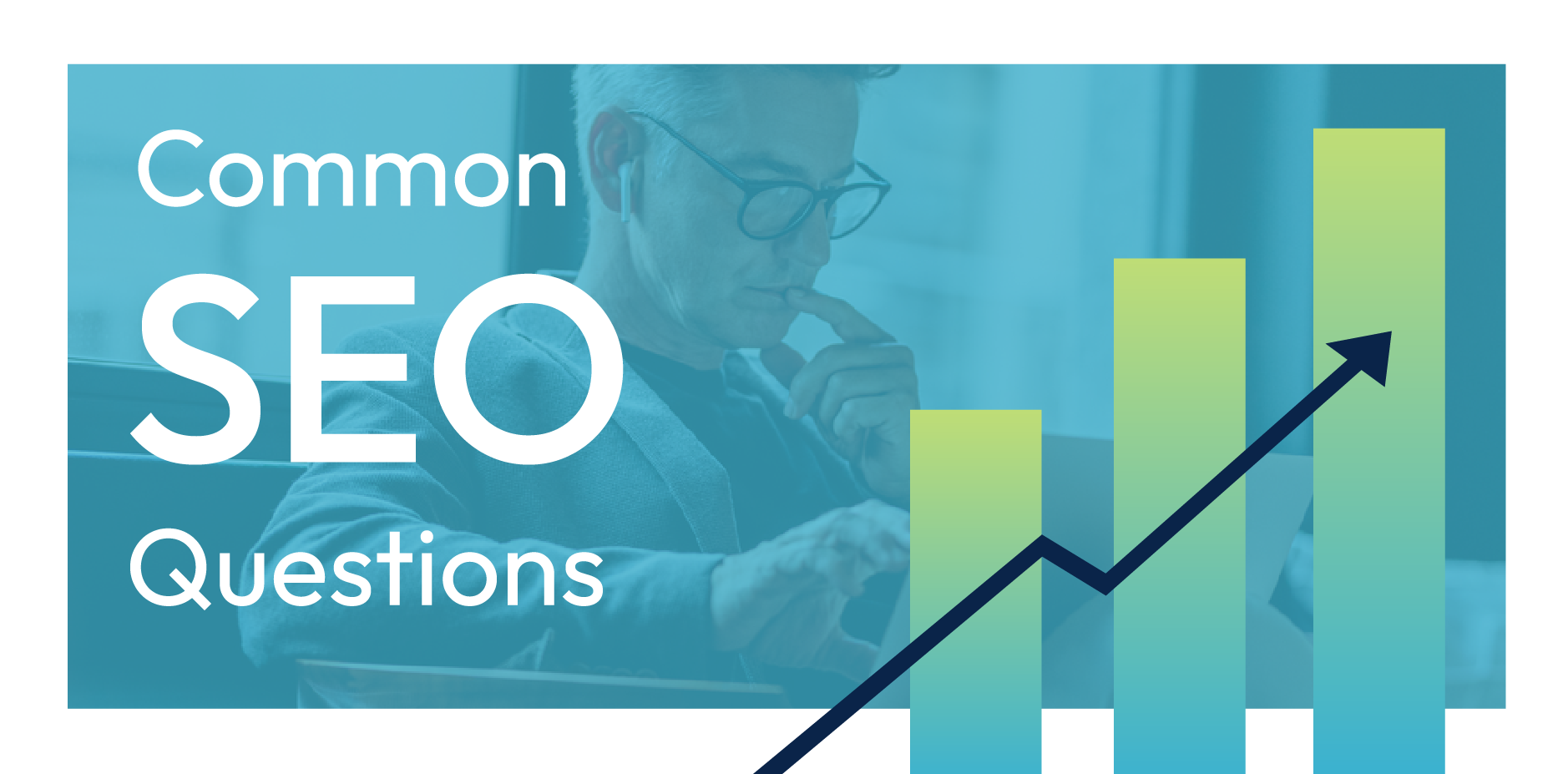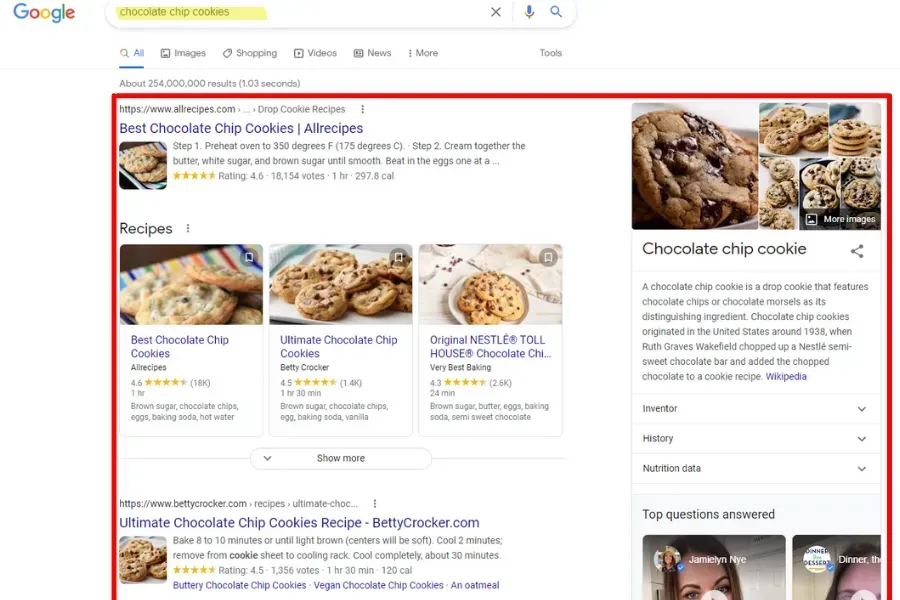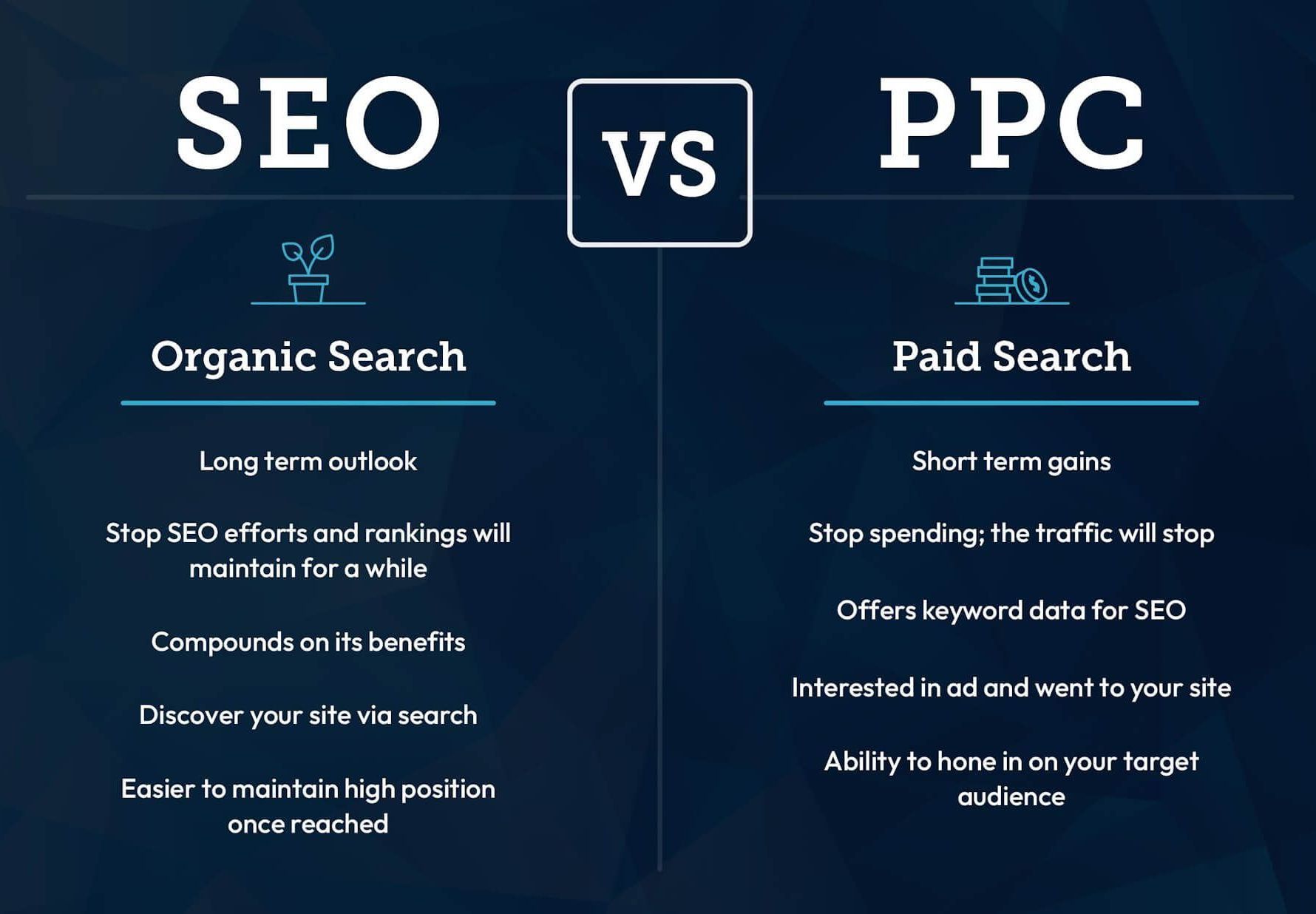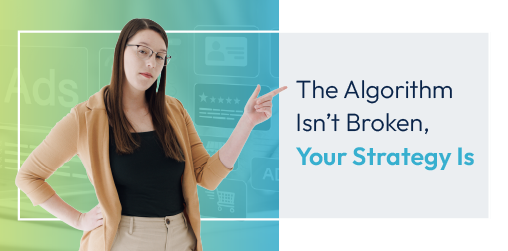15 Common SEO Questions

Digital marketing is not rocket science, but the ins-and-outs of SEO, PPC, content marketing, and social media are intricate and always changing. However, marketers and business owners interested in visibility on search engines like Google should know the basics of these digital marketing strategies.
In this piece, we’ll dive into 15 common SEO questions. Each question includes a brief explanation and a linked resource for further study.
1. What is Search Engine Optimization (SEO)?
SEO is the systematic process of improving a website’s visibility on major search engines like Google. Search engine visibility is achieved by ranking well for search queries. A query – or keyword, as you may hear in the industry – is simply the word or group of words a user searches.
The Search Engine Results Page (SERP) is the page Google returns when that keyword is entered.
In the image, my search query is highlighted, and the SERP results appear within the red box. Most individuals are well acquainted with both these features. The purpose of search engine visibility is to draw high-quality website traffic. As SEO moves your pages into prominent positions in the SERP, relevant searchers are more likely to see your listings and click through to your website.
To read more about the depths of search engine optimization, I recommend this article in particular, investigating SEO services.

2. Does Google Reward or Penalize Websites Doing SEO?
The idea that SEO is a subversive marketing strategy is false.
Major search engines, like Google, are designed to return the most helpful, high-quality result for searchers. SEO is designed to help Google understand the content on a page and the structure of a website, making it easier for Google to determine value and rank accordingly. In this way, Google rewards companies doing SEO.
Black-hat SEO is a separate and subversive set of tactics that do not align with Google’s webmaster guidelines, and this Google penalizes.
3. How Does SEO Work?
At RivalMind, we hold to two primary SEO strategies that drive digital visibility: the inside-out strategy and the outside-in strategy.
- The inside-out strategy includes defining goals, developing a keyword strategy, performing optimizations on a website, and backlink prospecting.
- The outside-in strategy includes identifying and prioritizing SEO work and performing technical fixes to a website’s structure.
SEO requires both strategies with testing, reporting, and repeating.
RivalMind aims to be an excellent resource for all things digital marketing, and we wrote an article on what are SEO services. Again, I highly recommend reading and bookmarking this article.
4. Does SEO Work?
Before investing in a particular marketing strategy, business owners should be confident their marketing dollars are well spent. If you invest in SEO for your company, is the return going to be worth it? Quite frankly, yes.
Search engine optimization has a consistently remarkable ROI, often producing business-altering results. Check out some of our client testimonials for additional insight into the effectiveness of SEO.
5. How Long Does it Take for SEO to Work?
Most often, SEO takes 4-6 months to start showing results. Some campaigns take longer or shorter depending on their niche, competition, website history, and other factors. Is this surprising?
We get it! Many businesses owners and marketers often do not have realistic expectations at the start of their SEO campaigns and feel discouraged if positive results are not seen within a few weeks. Often, the fault is not with businesses owners and marketers.
Often, the problem often lies with SEO agencies who fail to communicate a realistic timeline to clients. Others make lofty and naïve promises. If an agency guarantees instant results, be wary. This is simply unrealistic.
I must note – though SEO takes a few months to take off, the ROI of SEO is unparalleled. The waiting is worth it! While your SEO team actively works on your site, Google takes notice. High-quality SEO that produces long-term fruit is better than quick-fix marketing that can fizzle out.
We discuss the timeline of SEO further in a recent blog.
6. Is SEO or PPC More Effective?

SEO is a long-term marketing strategy designed to drive ongoing results, even after the campaigns have ended. Technically, SEO is free to do, besides the cost of tools and time. PPC drives leads quickly for as long as the campaign is running, and every click is paid for.
Both marketing channels are effective tools you can use to achieve different goals, and we often recommend running both simultaneously. For example, PPC could drive traffic to your website during the first months of SEO.
Read more about how SEO and PPC complement each other in our holistic digital strategy blog.
7. Should I Do SEO Myself or Hire Someone?
Consider your budget, time constraints, and expertise.
- Does your budget allow for marketing? If not, it should! Businesses should spend a minimum of 5% of sales revenue on marketing. If your budget does allow for marketing, SEO is an excellent digital marketing channel to pursue. Technically, however, SEO is free for you to do yourself.
- Consider your time constraints. Thought DIY SEO may not cost you anything financially, it will cost time. SEO should be detailed, strategic, and consistent. If you do not have the time to perform SEO tasks well, it may cost less in the long run to hire someone.
- Finally, evaluate your expertise. SEO can be learned! But SEO must also continue being learned, as the field changes regularly. Once again, many business owners opt for hiring SEO experts, because they simply do not have the time to keep up.
What are SEO Services?
The Ultimate Guide for Businesses
You've decided SEO is right for your company. This guide covers how to hire a great SEO provider, what to expect, and what should be included in your service!
8. How Much Does SEO Cost?
Once again, it depends!
Besides the cost of tools and time, DIY SEO is technically free. Hiring a full-time SEO expert onto your team generates typical employee expenses, including training costs, salary, and benefits. Hiring an outsourced digital marketing agency vary, ranging from about $500 to $15,000 for month-to-month retainers.
Check out our blog on the cost of SEO for all the variables that can impact your SEO bill – as well as some “cheap SEO” red flags to avoid.
9. Does a Mobile-Friendly Website Improve SEO?
Not only does a mobile-friendly website enhance your SEO efforts, a mobile-friendly website is essential for successful SEO efforts. How can we say this? Because Google said it first, years ago. Google boosts mobile-friendly pages on mobile search results. This is important, because over 52% of all website traffic worldwide is comprised of mobile traffic.
At RivalMind, every website we build is responsive across mobile, tablet, and desktop devices. Mobile usability is vital for any website looking for long-term success in the digital space.
Read more about
the importance of website design on our blog or check out the resource from Google linked above.
Want a free same-day SEO health scan?
No strings attached - receive a comprehensive report covering 140 unique data points about your website's technical SEO health in 24 hours or less!
10. Does Social Media Help SEO?
Google specialists have yet to define the precise weight of social media and Google rankings, though Hootsuite performed an experiment proving a positive correlation. Beyond this, social media helps SEO in numerous indirect ways.
To name a few:
- Social media and SEO are both centered around driving high-quality traffic to your website.
- An active presence on social media builds trust with your prospective customers.
- Your social media pages are indexed; they can rank in the SERP for branded search queries, like your business name.
Your business does not need to have a profile on every social media platform. Pick the one or two that best fit your niche and stay active. Prospective customers and clients often check social media for a glimpse into your business culture and personality.
We wrote an article answering the question: how does social media impact SEO? I recommend the read.
11. What is Keyword Research?
Keyword research is the process of identifying the best keywords to target for a particular company. At RivalMind, our keyword research process is multi-faceted. We consider what the client deems most important to rank for, use SEO tools to identify thousands of variant phrases and selecting the best ones, and – most importantly – perform competitive research.
Competitive research often uncovers hundreds of opportunity keywords, phrases your competition may be ranking well for that you’re missing out on.
Keyword research is a fundamental SEO task. Done properly, it will drive and define your digital marketing strategy, especially in content creation.
We highly recommend Moz’s guide on keyword research for continued education.
12. Are Backlinks Important?
Yes! In fact, most digital marketing agencies, including RivalMind, incorporate backlink acquisition into their SEO services.
Why are backlinks so important? Backlinks are a vote of confidence from one website to another. If a relevant, authoritative website links to a blog you wrote, Google takes note. That piece of content was valuable enough for another website to link to.
However, not every backlink is valuable. For example, links from spammy websites can hurt your reputation with Google. We chat about this and more in our blog about
the importance of backlinks for SEO.
13. Why is My Competitor Ranking Above Me in Google?
Your competitor could be ranking above you because Google has deemed their result of more value to the searcher than yours for a particular phrase at a particular time and a particular locale. The specific variable that Google has found more valuable among over 200 search ranking factors is sometimes difficult to pinpoint.
Let’s explore these three “particulars.”
- Particular phrase: your competitor may be ranking above you for one phrase, but you may be ranking above them for another. Every keyword presents a unique opportunity to rank above your competitors.
- Particular time: Google is constantly updating its algorithms, causing rankings to fluctuate. Next week, you may rank above your competitor for the search query, or a third website could have overtaken you and your competitor.
- Particular locale: For location-specific searches, Google takes the searcher’s location into consideration while displaying results. Thus, your competitor’s piece may rank above yours in one location and below yours in another.
14. Are Reviews Important for SEO?
Reviews are especially important for local SEO (SEO intended for businesses with customers in their surrounding locale).
Reviews demonstrate to Google and to prospective customers that your businesses is trustworthy and reputable. Most businesses owners we talk to agree with this statement – speaking of positive reviews. But what about negative ones? Are less-than-dazzling reviews beneficial for your digital marketing image? They can be!
Dissatisfied customers provide opportunity for positive impact. How? First, responding to a negative review well speaks to the trustworthiness of your business, just as much as a positive review. Respectful, kind responses to disgruntled reviewers demonstrate professionalism.
Second, dissatisfied customers may highlight areas for product or service improvement. In these cases, the negative perspective can drive positive change.
15. What Are Some Great Resources?
Are you interested in diving deeper into SEO? Here are a few great resources we read and recommend:
- The Moz Blog
- Search Engine Journal
- Search Engine Land
- The RivalMind Team (See Below)
RivalMind: Your Digital Marketing Resource
We have a team of SEO experts at RivalMind. If you have more questions about SEO or any other digital marketing tool (and want to chat with a real person), we would love to answer these!
You can get in touch with us on our contact page, at (331) 228-9396, or via the live chat icon at the bottom of every page on our site. We look forward to getting in touch!

Meet the Author
Matt Scroggs
CMO RivalMind
Hi, I'm Matt Scroggs, a digital marketing strategist. For two decades I served as the senior digital marketer for several global, iconic brands. Today, I'm the chief marketing officer at RivalMind, an agency 100% dedicated to helping companies thrive by driving transformational growth through innovative digital marketing. I'm also a lifelong Cubs fan, a faithful family man, and a web analytics junkie—relentlessly tracking conversions, loyalty, and advocacy, which are often as elusive as the pennant!
Specialties: Helping Businesses Grow, Marketing Strategy, Idea Guy
Looking for more organic website traffic?
Welcome to RivalMind. Our purpose is to help your business thrive. We are a digital marketing agency that offers SEO, PPC, Web Design, Social Media and Video Solutions as tools to our clients for online business development and growth.
Contact us today to get started!
Blog Contact Form
Connect with Us:




